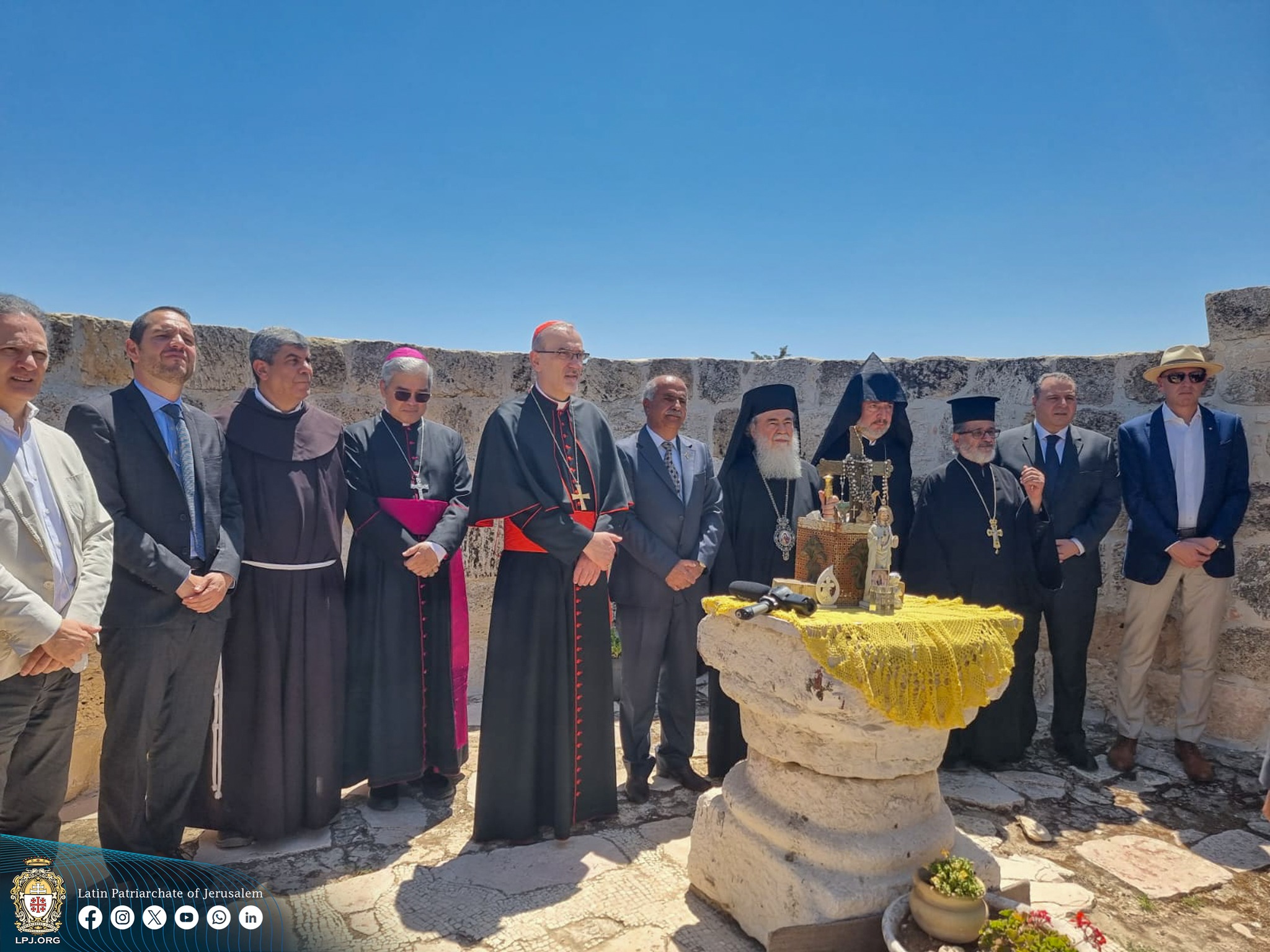Taybeh: Christian leaders, stronger than settler occupation, this is ‘our home'
This morning, a delegation led by Cardinal Pizzaballa and Patriarch Theophilus III visited the community that has come to symbolise settler violence. They slammed Israel’s pro-occupation policy, which affects Christians and Muslims alike. Marie-Armelle Beaulieu, a Christian journalist who has been in Jerusalem for 30 years, stressed the "exceptional" nature of an "ecumenical" event outside the Holy City.
Milan (AsiaNews) – The Patriarchs and Heads of the Churches of Jerusalem this morning accused Israeli authorities of facilitating or at least enabling the systematic presence and escalating attacks by Jewish settlers against the Palestinian Christian village of Taybeh, whose residents have endured grave harassment and intimidation, and suffered damage to their farmland.
In a show of solidarity, the Church leaders levelled their accusation during a visit to the community that has become the symbol of the violence associated with the pro-occupation policies of Prime Minister Benyamin Netanyahu's government.
In a statement released on the sidelines of the visit, Latin Patriarch of Jerusalem Cardinal Pierbattista Pizzaballa and Patriarch of the Orthodox Church Theophilos III expressed their closeness to the faithful who are victims of “an intensifying trend of systemic and targeted attacks.”
Speaking to Israeli media, the Latin primate added that he was in contact with the authorities and that an investigation had been launched. But when asked if he believed there would be an effective law enforcement response, he said: “I doubt it, but I hope so.”
The past few weeks have seen a rise in attacks against Taybeh, a West Bank village home to about 1,500 people and three churches, located some 30 km north of Jerusalem and east of Ramallah, the only village inhabited entirely by Christians.
The most emblematic incident occurred on 7 July, when pro-occupation fanatics set fire to the cemetery and the historic 5th century Church of St George (Al-Khadr), one of the most ancient religious sites in Palestine.
Among the residents, who include more than 600 Roman Catholics, plus Greek Orthodox and Greek Melkite Catholics, there is concern for the future of a community where Jesus retreated before his Passion, and is known since the times of Gospels.
The escalation began well before 7 October 2023, with Hamas's attack on Israel and the start of the conflict in Gaza. However, the war in the Gaza Strip and the 12-day war with Iran have given free rein to settlers and extremists who operate with complete impunity.
This morning, several Church leaders from the Holy Land arrived in Taybeh from Jerusalem and met with a local delegation and representatives of the nearby villages of Kufur Malek and Almazra' Al-Sharqiyeh at the town hall. They were joined by diplomats and journalists.
After a brief greeting from the parish priests, a video about the village and its land was shown, and then Theophilos III read the message, followed by a procession to the Byzantine church. In the area outside, the Christian leaders held a joint prayer.
Faced with the violence of recent months, with settlers herding animals to graze in cultivated fields, destroying them, or making them inaccessible, damaging olive trees, the Christian leaders are calling for "prayers, attention, and action of the world”.
The best response to the "persistent threats" as well as “the greatest act of bravery is to continue to call this your home. We stand with you, we support your resilience, and you have our prayers.”
Speaking to AsiaNews, Marie-Armelle Beaulieu, editor-in-chief of Terre Sainte magazine, who has been in Jerusalem for over 30 years and was present at the prayer in Taybeh, highlighted the large participation of Christian leaders from various denominations: Greek Orthodox, Latin, Greek Catholic, Armenian, Lutheran, and Anglican.
"The very fact that they came from Jerusalem," she explains, "is a great event." At the same time, "the number of journalists present and the countries represented by the diplomats constitute a victory" for an act of "solidarity" that has had “wide following”.
The goal, she added, was to speak out against “the policy of occupation” because it affects "Christians and Muslims" without distinction, as Theophilos III himself emphasised.
By the same token, she mentioned and stressed how "Christianity is deeply rooted" in this land, where it has been present "for two thousand years."
It is also worth mentioning "international law," which should sanction and legitimise the Christian presence in the face of "violent attacks" that pose a vital threat, even more so given the silence or collusion of “Israeli authorities.”
Notwithstanding the “exceptional nature" of an event "outside Jerusalem,” Marie-Armelle Beaulieu described as particularly moving and meaningful the prayer conducted in the Eastern Orthodox tradition, in Arabic and Greek, which highlights its "ecumenical character”.
“Praying together," she said, "goes beyond writing texts or giving speeches, but means taking this time that is proper to Christians, that of prayer, to turn with trust to God."
The local Latin parish priest, Fr Bashar Fawadleh noted how the land to which Jesus retreated in the last days is "a place where security is denied and sacred spaces are burned."
Yet, he insisted, “we declare with unshakeable faith: we remain. [. . .] We are not passers-by, nor migrants, nor foreigners. This land is not just a homeland . . . It is a calling, a mission, and a covenant that will not be broken,” he stressed.
Taybeh today, he warns, is not an isolated case but "a true mirror of what the towns and villages of the entire West Bank are suffering."
A final condemnation comes from King Abdullah of Jordan, who slammed the "brutal attacks" carried out by "extremist settlers" whose "severity" requires “an immediate and firm international position.”
(Picture from the website of the Latin Patriarchate of Jerusalem)
02/03/2024 15:55
31/01/2020 16:17
20/11/2023 19:03







.png)










